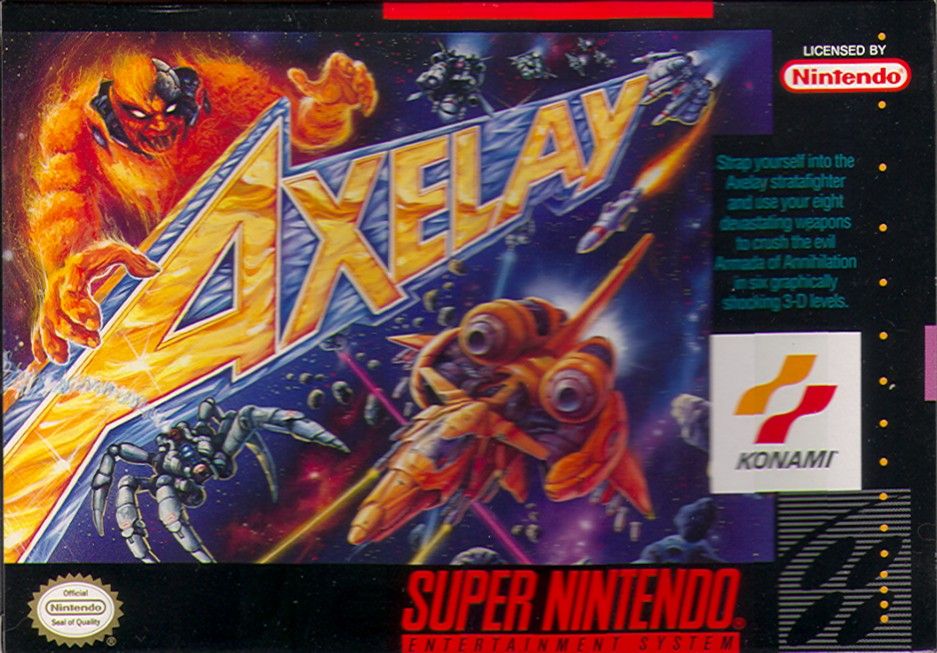Retro Replay Review
Gameplay
Axelay delivers a classic shoot-’em-up experience that seamlessly blends horizontal and vertical scrolling stages. Players pilot the AX-77 Axelay, a prototype fighter armed with an array of upgradable weapons that drastically change the pacing of the action. From the initial spread shot to the explosive wave cannon, each armament adds strategic depth, forcing you to adapt based on enemy formations and boss attack patterns.
(HEY YOU!! We hope you enjoy! We try not to run ads. So basically, this is a very expensive hobby running this site. Please consider joining us for updates, forums, and more. Network w/ us to make some cash or friends while retro gaming, and you can win some free retro games for posting. Okay, carry on 👍)
The dual scrolling system keeps gameplay fresh throughout its five stages. Horizontal levels play out like traditional side-view shooters, emphasizing precise dodging and forward fire. When the action switches to vertical scrolling, the entire playfield transforms via Mode 7 backgrounds, creating a pseudo-3D effect that enhances the feeling of speed as alien warships and ground installations rush toward you.
Weapon selection is a critical element: each stage offers primary and secondary fire modes, but ammunition is limited, so deciding when to unleash your most powerful attacks becomes a tense balancing act. Defensive maneuvers like barrel rolls and bomb countermeasures further diversify the combat, rewarding timing and spatial awareness. With steadily increasing difficulty, every playthrough hones your reflexes and strategy in equal measure.
Boss encounters are standout moments, introducing massive alien constructs that demand pattern memorization and split-second adjustments. Their multi-phase attacks exploit both horizontal and vertical movement, making use of the AX-77’s full arsenal. This emphasis on memorization and adaptation elevates each climactic showdown into a genuine test of skill.
Graphics
For its era, Axelay’s visuals remain breathtaking thanks to the innovative use of the Super Nintendo’s Mode 7. Vertical scrolling stages employ rotating and scaling backgrounds that give the illusion of diving into deep canyon scores or evading incoming enemy swarms across vast deserts. The sense of depth and speed is unparalleled among contemporaries.
Horizontal stages shine with richly detailed pixel art: sprawling alien cities, mechanized ground turrets, and shimmering energy barriers. Enemy designs range from insectoid fighters to massive carrier ships, each animated with a surprising fluidity. Explosions bloom in vibrant reds and oranges, contrasting against verdant planetscapes and starfield backdrops.
Mode 7 isn’t simply a gimmick—it’s woven into level design. In world 3, for instance, a series of twisting canyon walls rotate seamlessly under your craft, creating ever-shifting chokepoints. The effect is not only visually impressive but also influences gameplay, as enemies emerge from unexpected angles.
The game’s heads-up display stays unobtrusive, conveying vital information on weapon loadouts and remaining lives without obscuring the action. Combined with crisp sprite scaling and parallax layers, Axelay’s graphics deliver an immersive sci-fi spectacle that still holds up when compared to modern pixel-art shooters.
Story
Axelay’s narrative is lean yet evocative. The opening premise—an unassuming world shattered by a ruthless alien incursion—sets a dire tone. With the indigenous defense forces decimated, hope rides on a single prototype: the AX-77. This lone starfighter represents humanity’s last chance to strike at the heart of the invaders.
While the plot advances mostly between levels, stage environments double as storytelling devices. Levels unfold across burnt-out city ruins, alien manufacturing complexes, and the core of the enemy mothership. Each locale reveals more about the aliens’ technological might and hints at their ultimate plans, from biomechanical architecture to pulsating energy reactors.
Mid-mission briefings are succinct but atmospheric, featuring terse radio chatter and mission objectives that immerse you in the pilot’s shoes. There’s no overreliance on text dumps; Axelay trusts its visuals and action sequences to carry the emotional weight of the struggle.
Ultimately, the story is a backdrop for high-octane combat, but its stark “one last ship against the invaders” premise keeps the stakes crystal clear. This simplicity ensures you remain focused on the core thrill: blasting through waves of alien forces to save your homeworld.
Overall Experience
Playing Axelay feels like a masterclass in shoot-’em-up design. The alternating scroll directions never grow stale, and the prototype ship’s arsenal provides enough variety to keep you invested across multiple playthroughs. Even seasoned genre veterans will find themselves hooked on perfecting each stage’s optimal route and weapon strategy.
Replayability is high thanks to hidden power-up paths and the incentive to conserve bombs for later bosses. The precise controls and consistent performance ensure that every retry feels fair—deaths are always attributed to player error, never technical shortcomings.
Axelay’s soundtrack deserves mention as well, with laser-sharp beats and soaring melodies that intensify the adrenaline rush. Each track aligns with its stage’s mood, whether you’re weaving through urban sprawl or descending into the alien core.
More than three decades after its release, Axelay remains an essential title for shoot-’em-up aficionados and newcomers alike. Its elegant fusion of gameplay mechanics, striking visuals, and minimalist yet effective storytelling make it a standout entry in the SNES library—and a must-own for anyone seeking a timeless arcade challenge.
 Retro Replay Retro Replay gaming reviews, news, emulation, geek stuff and more!
Retro Replay Retro Replay gaming reviews, news, emulation, geek stuff and more!









Reviews
There are no reviews yet.